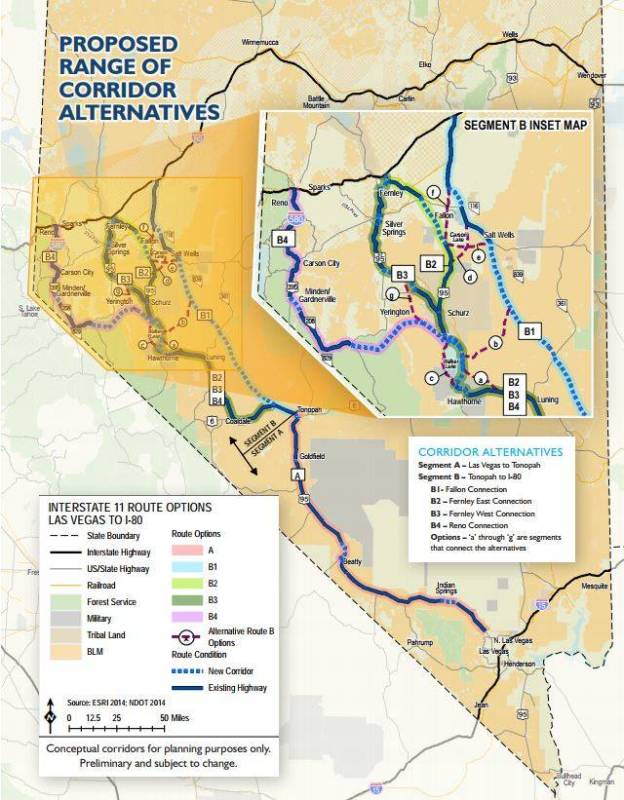
The Nevada Department of Transportation is set to host several public information meetings across Nevada to better pinpoint the future expansion of Interstate 11 through the northern half of the state.
NDOT is looking to gain public input from individuals across Nevada communities for a study on potential routes for the future northern portion of the planned I-11 that will eventually run between Las Vegas and Interstate 80.
Several public meetings are planned at the end of July and the first part of August across the state for the roughly 450-mile-long interstate under development. Some segments of I-11 have already opened in Clark County.
“The future I-11 will not only further connect our state, but the entire West,” said NDOT Director Rudy Malfabon in a news release. “It will bring enhanced mobility, traffic safety, freight and other opportunities for Nevada.”
The first of several public meetings is set to start at 2 p.m. on July 24 at the NDOT headquarters in Carson City, which will also be streamed live on the agency’s Facebook page.
A video conference, available for public attendance, will be held at NDOT’s district office in Las Vegas at 123 E. Washington Ave. in the conference room in Building A for the planned three-hour-long meeting.
Another public meeting is planned in Southern Nevada on Aug. 9 at Santa Fe Station and Casino at 4949 N. Rancho Drive. The meeting, which is scheduled from 4 p.m. to 7 p.m., will run in an open house format with a formal presentation planned to begin at 5:30 p.m.
A meeting held in March on I-11 was also held at Santa Fe Station.
At that time, planners spoke about the future route extending from the Las Vegas Valley.
The future four-lane divided highway system is expected to run along what is now U.S. Highway 95 up to Tonopah. Existing portions of Highway 95 could be used for I-11’s extension, and new portions of highway could also be created, NDOT planners said during that meeting.
NDOT has released four alternative routes for I-11 beyond Tonopah, toward I-80.
“Following the March public and stakeholder meetings, each corridor alternative was evaluated and ranked based on established evaluation, screening and scoring criteria,” NDOT stated in a news release.
Those rankings will be discussed at the upcoming meetings, and “NDOT will make recommendations on those corridor alternatives which will be further advanced in the future,” the agency reported in a news release.
One of the alternative routes being considered from Tonopah to I-80 could run from Tonopah up through Salt Wells. Another potential route could run from Tonopah and through Fallon.
The other two potential routes include a route from Tonopah and through Silver Springs and Fernley or a road that connects to Reno before heading off to I-80.
In the 1990s, the federal government took action on increasing international trade between the U.S., Canada and Mexico. Congress worked to designate high-priority corridors in the Intermountain West area at that time, according to NDOT.
“The 1991 Intermodal Surface Transportation Efficiency Act and 1995 National Highway Systems Designation Act identified a series of high-priority corridors for federal funding including the Canada, U.S., Mexico (CANAMEX) Trade Corridor. This designation recognizes the importance of the CANAMEX corridor to the U.S. economy, defense and mobility,” according to information i11study.com
The actions of Congress over the years have developed into I-11.
A 2014 study by NDOT and the Arizona Department of Transportation found that the route running from the southern portion of Arizona through Las Vegas and the northwestern part of the state up to I-80 was the best alternative. That study is known as the Intermountain West Corridor Study.
The current “evaluations help potentially narrow the feasible range of corridor alternatives for future planning and environmental review; helping streamline environmental review and development of this interstate facility over future decades. The efforts could also help designate and preserve public lands needed for the future interstate,” NDOT stated in a news release.
The groundwork being laid in NDOT’s recent study is setting the stage for future National Environmental Policy Act (NEPA) studies, according to information on NDOT’s website.
Feedback can be emailed to Kevin Verre at kverre@dot.nv.gov for those unable to attend the public meetings. More information on the I-11 project is available at I11study.com
Contact reporter Jeffrey Meehan at jmeehan@pvtimes.com